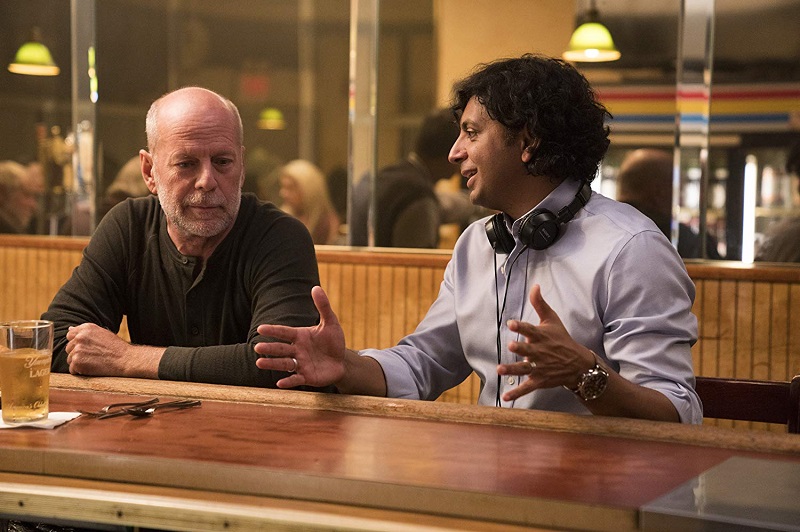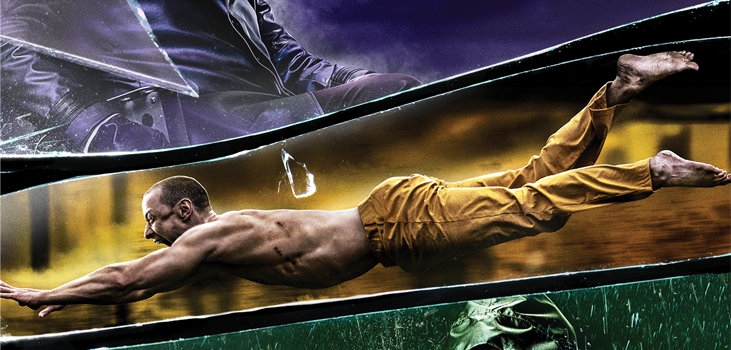After the thespian master class that James McAvoy delivered in Split, jaws hit the floor and they weren’t from basking in the glow that was McAvoy’s stunning turn delivering dozens of characters all inhabiting one body and a complicated mind. The shock and awe came from the reveal that the film was not merely a M. Night Shyamalan stand-alone thrill ride. Turns out, Split was a sequel to Unbreakable and set up what has become a trilogy. That final chapter, Glass, has arrived on DVD, Blu-Ray and digital download formats.

The film is certainly one of Shyamalan’s best and delivers on the promise that was laid out with the filmmaker’s second film almost two decades prior. Again, the headline is McAvoy and his stunning turn as a myriad of characters all stuck in the complicated brain of Kevin Wendall Crumb. But there is also lots to brilliance to bask in from all the players in the ensemble that features Bruce Willis’ return as David Dunn, Samuel L. Jackson’s second stab as Elijah Price, aka Mr. Glass and a scene-stealing effort by Sarah Paulson as Dr. Ellie Staple—the mental health professional charged with treating this trifecta of souls who believe they are acting out a superhero story.
The existence of the Staple character is an interesting addition to the supernatural world that Shyamalan loves to play in. Her entire existence is to prove that there is a mental affliction that is shared by a sliver of folks who believe that their world is out of a comic book. By having what happened in Unbreakable and Split appear to be psychologically-based, the filmmaker is doing much more than having a “devil’s advocate” to spar with his characters who firmly know (as does the audience) that there is nothing that is going on in Price, Dunn or Crumb’s world that is in their head.
Returning to the fold, as well, is Spencer Treat Clark as Dunn’s son Joseph, as well as Charlayne Woodard as Elijah’s mother, aka Mrs. Price and Anya Taylor-Joy reprises her role as Casey Cooke from Split. The latter’s role is huge as she plays a part that has the potential of playing to Crumb’s fascination with her in hopes of Staple being able to “help” him.
What Glass does best is take a world that audiences now know supremely well, superheroes, and break it down to its most basic of storytelling elements. There are heroes and there are villains. How one becomes either lies at the root of this cinematic journey. What is so fascinating is when Unbreakable premiered, there had been little movement in the superhero world since those 1970s Christopher Reeve-starring Superman movies. Now, there’s a superhero flick arriving on screens every other month. Shyamalan takes this milieu in delivers it in Glass in the most unorthodox of manners to an audience that keenly knows their way around a superhero story structure. Where the filmmaker takes his characters is wildly surprising, but firmly fits within the scope that was established in both Unbreakable and in Split. Is it satisfying for audiences? Absolutely, in fact it will make you think about this film long after witnessing it and therefore lends itself to repeated viewings, i.e. purchase Glass for the chance to watch it whenever you want as well as those bonus features that offer priceless insight into the making of the movie, as well as the mindset of all those involved as the process moved from an idea to an international cinema sensation.
For starters, there is a never-before-seen alternate opening that is surprisingly sincere. One can see why the filmmaker went with the one that made the final cut, but by including that alternative opening in the home video release of Glass fans get a front-row seat to the storytelling mentality of the man who was once dubbed “The next Spielberg” by Newsweek.
Given that McAvoy, frankly, deserves some Oscar love for what he achieved in Split and now in Glass, the bonus feature I dove into first was A Conversation with James McAvoy and M. Night Shyamalan. The featurette is a little on the too-short side (it clocks in at just over 5 minutes) but features the actor and the helmer giving priceless insight into their view of the film’s tone, the evolution of characters and how they altered their storytelling efforts moving from Split to Glass.
Next up for our viewing pleasure was The Collection of Main Characters. It is an equally informative and entertaining look at all the main characters and their spot in the universe created by Shyamalan all those years ago. Bringing the Team Back Together, meanwhile, focuses on Shyamalan and how he tries to tap the same crew to work with him, from film to film. Offering a view into his working style is a great commentary given by that crew and this stunning cast. The personal stories are insightful and highlight something that never occurred to me before, there is a congruency to all of his films, and it starts with him—yes—but it is largely due to familiar faces inhabiting important roles from in front of the camera and behind it.

Speaking of the filmmaker, M. Night Shyamalan: Behind the Lens gives fans a great look at the storyteller’s method to his madness. Cast and crew add their insight and paint a picture of a perfectionist that is approachable, collaborative and capable of causing chills for his audiences.
Glass Decoded is a terrific featurette that finds the filmmaker divulging secrets for the entire trilogy that will have you wanting to circle back and watching the film again (and again!).
Breaking Glass: The Stunts is a terrific behind-the-scenes look at some of the more riveting action sequences and answers those pesky “how did they do that?” questions. One of those gets an added close-up and that’s David Dunn vs. The Beast. The animalistic face-off between David Dunn and The Beast is broken down to its basics and as such, viewers get a sensational look at how that pivotal scene was achieved.
Connecting the Glass Universe is a must-see for fans of the filmmaker because it offers insight into the mental thought process that goes into him creating not only one singularly sensational film, but an entire trilogy. Of particular note is how the storyteller took an off the beaten path approach to a comic book movie but grounding it in the “real world.”
The Sound of Glass and Enhancing the Spectacle put the spotlight on composer West Dylan Thordson and the VFX team who outdid themselves with Shyamalan’s latest.
Lastly, for the Shyamalan fan, Night Vision works miracles in under two minutes in how it paints a fantastical picture at how the filmmaker starts his moviemaking process from its infancy.
Film grade: B
Bonus features: A

